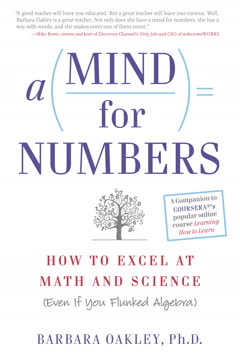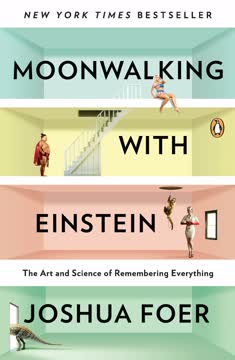Key Takeaways
1. Transform Your Memory with Creative Visualization
"Memory is a creative process and not a photographic process."
Bring information to life. The key to exceptional memory is transforming bland information into vivid, multisensory mental images. Use the SEE principle: Senses (engage all five), Exaggeration (make images larger or smaller than life), and Energize (add action and color). This approach taps into your brain's natural ability to remember visual and sensory information.
Create meaningful connections. Turn abstract concepts into concrete images by finding words that sound similar or breaking them into component sounds. For example, "Washington" becomes "washing a tin." This technique works for remembering foreign words, historical dates, and complex terminology across various fields of study.
- Example: To remember "Tiger" in Spanish (Tigre), imagine a tiger drinking grey tea.
- Apply this method to subjects like anatomy, chemistry, or any field with abstract terms.
2. Harness the Power of Association and Linking
"We only learn by association. Learning is connecting new information to old information, it doesn't happen any other way."
Create mental file systems. Use familiar objects or locations as "pegs" to hang new information. The Car Method, Body Method, and Rhyming Peg System provide structured ways to organize and recall lists of information. These systems leverage your long-term memory to store short-term information more effectively.
Link concepts creatively. Connect pieces of information by creating outlandish, memorable stories. This technique works well for remembering lists, historical facts, or any sequence of information. The more unusual and vivid the connections, the easier they are to recall.
- Example: Remember the first U.S. Presidents by linking "washing a tin" (Washington) to "Adams apple" (Adams) to "a chef and her son" (Jefferson).
- Use this method to memorize key points for presentations, important dates, or any list of facts.
3. Master the Journey Method for Unlimited Recall
"This method is the original and still the most effective of all the systems. Using this system is as easy as remembering a journey."
Create mental landscapes. Choose a familiar location or route and use it as a backdrop to store information. This method, also known as the Method of Loci, has been used for thousands of years and is the cornerstone of competitive memory techniques. It allows for easy sequential and random access to stored information.
Expand your mental space. As you become more proficient, create multiple journeys for different subjects or areas of knowledge. This technique has virtually unlimited potential for storing and organizing information in your mind.
- Example: Use rooms in your house to remember a list of tasks or points for a speech.
- Advanced users can create elaborate mental palaces to store vast amounts of information.
4. Conquer Numbers and Dates with the Number-Shape System
"When each number represents an image you can hold the number in your mind and place it on a system to remember as many numbers as you choose."
Transform numbers into images. Learn the Number-Shape System to convert digits into consonant sounds, which can then be turned into words and vivid images. This powerful technique allows you to remember long strings of numbers, dates, and even entire decks of playing cards.
Apply to various fields. Use this system to remember phone numbers, historical dates, scientific constants, or any numerical data relevant to your work or studies. With practice, you can develop an exceptional memory for numbers that will serve you in countless situations.
- Basic system: 0=S/Z, 1=T/D, 2=N, 3=M, 4=R, 5=L, 6=J/CH/SH, 7=K/C, 8=F/V, 9=P/B
- Example: Remember 1492 as "Tire Pan" - imagine Columbus sailing in a giant tire filled with pots and pans.
5. Revolutionize Your Name Recall Abilities
"There is no such thing as a good or bad memory for names, there is only a good or a bad strategy."
Focus and create associations. When meeting someone new, concentrate fully on hearing their name. Create a vivid, often exaggerated image linking their name to a prominent feature of their face or appearance. This technique dramatically improves name recall.
Practice and review. Regularly review the names you've learned, using spaced repetition to reinforce your memory. Create a system for logging and reviewing new names, such as a dedicated contact list or journal.
- Example: For "George" with bushy eyebrows, imagine George of the Jungle swinging from his eyebrows.
- Use the person's profession, hobbies, or any distinctive traits to create more memorable associations.
6. Optimize Learning and Studying with Memory Techniques
"Learning new information isn't helpful unless it can be recalled later. Anything that increases one's memory power increases access to everything learned."
Apply memory systems to your studies. Use the journey method, linking, and other techniques to organize and remember course material. Create a "memory vocabulary" of key concepts in your field, using consistent images for recurring terms.
Enhance comprehension and recall. By actively engaging with the material through these techniques, you not only memorize facts but also deepen your understanding. This approach leads to better long-term retention and application of knowledge.
- Break down complex subjects into manageable chunks and create memory journeys for each section.
- Use Mind Mapping to visually organize information and see connections between concepts.
- Regular review using these techniques reinforces learning and prevents forgetting.
7. Cultivate Self-Discipline for Lasting Memory Improvement
"There has never-ever been an undisciplined world champion. Our rewards are always directly proportional to our efforts."
Commit to consistent practice. Like any skill, memory improvement requires regular training. Set aside time each day to work on your memory techniques, gradually increasing the difficulty and complexity of what you memorize.
Apply techniques in daily life. Look for opportunities to use your memory skills in everyday situations, from remembering shopping lists to learning new skills at work. The more you integrate these techniques into your life, the more natural and effortless they become.
- Start with small, achievable goals and gradually increase the challenge.
- Track your progress to stay motivated and identify areas for improvement.
- Join memory clubs or participate in memory competitions to push your skills further.
Last updated:
FAQ
What's "Unlimited Memory" about?
- Memory Enhancement Focus: "Unlimited Memory" by Kevin Horsley is about using advanced learning strategies to improve memory, learn faster, and be more productive.
- Practical Techniques: The book provides practical methods and mindsets to enhance memory, drawing from both ancient techniques and modern research.
- Personal Development: It emphasizes the importance of memory in personal development and achieving goals, suggesting that memory is foundational to learning and intelligence.
Why should I read "Unlimited Memory"?
- Improve Learning Efficiency: The book offers strategies to learn and remember information more efficiently, which can be beneficial for students and professionals alike.
- Boost Confidence: By improving memory, readers can gain confidence in their ability to recall information and make better decisions.
- Life Transformation: The author suggests that mastering memory can lead to significant improvements in various areas of life, including self-discipline and productivity.
What are the key takeaways of "Unlimited Memory"?
- Memory as a Habit: Memory can be improved with the right training and practice, as it is largely a habit rather than an innate ability.
- Four Cs of Memory: The book outlines four keys to improving memory: Concentration, Creation, Connection, and Continuous use.
- Practical Methods: Techniques such as the Car Method, Body Method, and Journey Method are provided to help organize and recall information effectively.
What are the best quotes from "Unlimited Memory" and what do they mean?
- "Memory is the glue that binds your life together." This quote emphasizes the fundamental role memory plays in shaping identity and experiences.
- "You can have success or excuses, but you can’t have them both." It highlights the importance of taking responsibility for one's learning and memory improvement.
- "Where your attention goes, your energy flows." This suggests that focusing attention is crucial for effective learning and memory retention.
How does Kevin Horsley suggest improving concentration in "Unlimited Memory"?
- Be Present: The book advises being fully present in the moment to enhance concentration, as distractions can significantly impair memory.
- Eliminate Multitasking: Horsley argues that multitasking divides attention and reduces effectiveness, advocating for single-task focus.
- Control Inner Voice: Managing self-talk and focusing on positive, constructive thoughts can improve concentration and memory.
What is the Car Method in "Unlimited Memory"?
- Long-term Storage: The Car Method uses familiar parts of a car as long-term memory compartments to store new information.
- Visualization: By visualizing information as images placed on different parts of the car, memory retention is enhanced.
- Practical Application: This method is particularly useful for memorizing lists or sequences, as it leverages existing memory structures.
How does the Body Method work in "Unlimited Memory"?
- Body as a Memory Tool: The Body Method uses parts of the body as storage compartments for information, capitalizing on familiarity.
- Sequential Order: Information is linked to specific body parts in a logical sequence, aiding recall.
- Creative Visualization: By creating vivid, memorable images associated with each body part, the method enhances memory retention.
What is the Journey Method in "Unlimited Memory"?
- Familiar Routes: The Journey Method involves using familiar routes or locations as a framework to store and recall information.
- Sequential Markers: Information is placed at specific markers along the journey, making it easier to remember in order.
- Unlimited Potential: This method allows for the storage of large amounts of information by creating multiple journeys.
How does Kevin Horsley address remembering names in "Unlimited Memory"?
- Concentration on Names: Focus on hearing and repeating the name during introductions to improve recall.
- Create Associations: Form visual images or associations with the name to make it more memorable.
- Continuous Use: Use the name in conversation and review it mentally to reinforce memory.
What strategies does "Unlimited Memory" offer for remembering numbers?
- Number Code System: The book introduces a system where numbers are converted into letters and then into words for easier recall.
- Visual Associations: By creating visual images for numbers, they become more memorable and easier to recall.
- Practice and Application: Regular practice with this system can significantly enhance numerical memory.
How does "Unlimited Memory" suggest using art to improve memory?
- Visual Representation: Turning information into drawings or images can make it more memorable.
- Engagement and Creativity: Engaging with information creatively through art enhances memory retention.
- Mind Mapping: The book recommends mind mapping as a tool to organize and visualize information effectively.
What role does self-discipline play in "Unlimited Memory"?
- Essential for Mastery: Self-discipline is crucial for consistently applying memory techniques and achieving mastery.
- Daily Practice: Regular practice and review are necessary to develop and maintain memory skills.
- Vision and Motivation: A clear vision and strong motivation are important for sustaining self-discipline in memory improvement efforts.
Review Summary
Unlimited Memory receives mostly positive reviews, with readers praising its practical techniques for improving memory and concentration. Many find the methods effective and easy to implement, particularly for memorizing lists, numbers, and names. Some readers appreciate the book's motivational aspects, while others find them excessive. Critics note that some techniques may not be suitable for all types of information retention. Overall, readers recommend the book for students and anyone looking to enhance their memory skills, though some suggest the original language version over translations.
Similar Books







Download PDF
Download EPUB
.epub digital book format is ideal for reading ebooks on phones, tablets, and e-readers.




